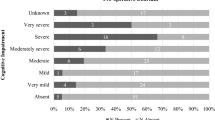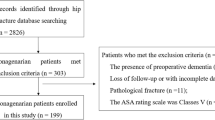Abstract
Background
Hip fractures precipitate several acute adverse outcomes in elderly people, thus leading to chronic adverse outcomes.
Objectives
The objective of our study was to examine the clinical characteristics associated with incident delirium in community dwelling elderly individuals who have a hip fracture.
Design
Retrospective observational cohort study.
Setting
Data was collected from an academic tertiary hospital affiliated with McGill University.
Participants
114 elderly individuals who were above 65 years of age, who underwent surgery for a fractured hip.
Measurements
The main outcome variable was incident delirium, which was assessed by chart reviews of notes and observations recorded by nurses and physicians when patients were admitted post operatively to the surgical unit. Covariates included age, sex, length of stay, delay to surgery, number of medical comorbidities, number of medications and hip fracture location, and were extracted from medical records. Baseline mobility and functional status, preoperative cognitive impairment, postoperative complications, regular psychotropic medications, psychotropic medications in hospital, and location of discharge were also assessed through chart review.
Results
The results demonstrated that 17.5% of participants with a diagnosis of delirium had a longer length of hospitalization (p = 0.01), a lower baseline functional status (p = 0.03) and pre-operative cognitive impairment (p = 0.01). Patients receiving new psychotropic medications in hospital were more likely to have delirium (OR = 4.6, p = 0.01) which was independent of pre-operative cognitive impairment.
Conclusion
We have shown that an association exists between psychotropic medication prescription and incident delirium in patients with hip fractures, even when adjusting for cognitive impairment. Hence, the prescription of psychotropic drugs should be judicious in these patients so as minimize the risk of adverse outcomes.
Similar content being viewed by others
References
Panel on Prevention of Falls in Older Persons, A.G.S. and S. British Geriatrics. Summary of the Updated American Geriatrics Society/British Geriatrics Society clinical practice guideline for prevention of falls in older persons. J Am Geriatr Soc 2011;59:148–157.
Chaudhry H, Devereaux PJ, Bhandari M. Cognitive dysfunction in hip fracture patients. Orthop Clin North Am 2013;44:153–162.
Lai SW, Chen YL, Lin CL, Liao KF. Alzheimer’s disease correlates with greater risk of hip fracture in older people: a cohort in Taiwan. J Am Geriatr Soc 2013;61:1231–2.
Seitz DP, Adunuri N, Gill SS, Rochon PA. Prevalence of dementia and cognitive impairment among older adults with hip fractures. J Am Med Dir Assoc 2011;12:556–64.
Bruce AJ, Ritchie CW, Blizard R, Lai R, Raven P. The incidence of delirium associated with orthopedic surgery: a meta-analytic review. Int Psychogeriatr 2007;19:197–214.
Oh ES, Li M, Fafowora TM, et al. Preoperative risk factors for postoperative delirium following hip fracture repair: a systematic review. Int J Geriatr Psychiatry 2015;30:900–10.
Gilmore ML, Wolfe DJ. Antipsychotic prophylaxis in surgical patients modestly decreases delirium incidence—but not duration—in high-incidence samples: a meta-analysis. Gen Hosp Psychiatry 2013;35:370–5.
Kalisvaart CJ, Vreeswijk R, de Jonghe JF, Milisen K. [A systematic review of multifactorial interventions for primary prevention of delirium in the elderly]. Tijdschr Gerontol Geriatr 2005;36:224–31.
Kalisvaart KJ, de Jonghe JF, Bogaards MJ, et al. Haloperidol prophylaxis for elderly hip-surgery patients at risk for delirium: a randomized placebo-controlled study. J Am Geriatr Soc 2005;53:1658–66.
Sampson EL, Raven PR, Ndhlovu PN, et al. A randomized, double-blind, placebo-controlled trial of donepezil hydrochloride (Aricept) for reducing the incidence of postoperative delirium after elective total hip replacement. Int J Geriatr Psychiatry 2007;22:343–9.
de Jonghe A, van Munster BC, Goslings JC, et al. Effect of melatonin on incidence of delirium among patients with hip fracture: a multicentre, double-blind randomized controlled trial. CMAJ 2014;186:e547–56.
Chatterjee S, Chen H, Johnson ML, Aparasu RR. Risk of falls and fractures in older adults using atypical antipsychotic agents: a propensity score-adjusted, retrospective cohort study. Am J Geriatr Pharmacother 2012;10:83–94.
Taipale H, Koponen M, Tanskanen A, et al. Antipsychotic polypharmacy among a nationwide sample of community-dwelling persons with Alzheimer’s disease. J Alzheimers Dis 2014;41:1223–8.
Inouye SK, van Dyck CH, Alessi CA, et al. Clarifying confusion: the confusion assessment method. A new method for detection of delirium. Ann Intern Med 1990;113:941–8.
Inouye SK, Marcantonio ER, Metzger ED. Doing Damage in Delirium: The Hazards of Antipsychotic Treatment in Elderly Persons. Lancet Psychiatry 2014;1:312–5.
Juliebo V, Bjoro K, Krogseth M, et al. Risk factors for preoperative and postoperative delirium in elderly patients with hip fracture. J Am Geriatr Soc 2009;57:1354–61.
Maldonado JR. Neuropathogenesis of delirium: review of current etiologic theories and common pathways. Am J Geriatr Psychiatry 2013;21:1190–222.
Marcantonio ER, Palihnich K, Appleton P, Davis RB. Pilot randomized trial of donepezil hydrochloride for delirium after hip fracture. J Am Geriatr Soc 2011;59 Suppl 2:S282-8.
Hshieh TT, Yue J, Oh E, et al. Effectiveness of multicomponent nonpharmacological delirium interventions: a meta-analysis. JAMA Intern Med 2015;175:512–20.
Neufeld KJ, Yue J, Robinson TN, Inouye SK, Needham DM. Antipsychotic Medication for Prevention and Treatment of Delirium in Hospitalized Adults: A Systematic Review and Meta-Analysis. J Am Geriatr Soc 2016;64:705–14.
Jones RN, Yang FM, Zhang YM, et al. Does educational attainment contribute to risk for delirium? A potential role for cognitive reserve. J Gerontol A Biol Sci Med Sci 2006;61:1307–11.
Marcantonio ER, Flacker JM, Michaels M, Resnick NM. Delirium is independently associated with poor functional recovery after hip fracture. J Am Geriatr Soc 2000;48:618–24.
Alegre-Lopez J, Cordero-Guevara J, Alonso-Valdivielso JL, Fernandez-Melon J. Factors associated with mortality and functional disability after hip fracture: an inception cohort study. Osteoporos Int 2005;16:729–36.
Krogseth M, Wyller TB, Engedal K, Juliebo V. Delirium is an important predictor of incident dementia among elderly hip fracture patients. Dement Geriatr Cogn Disord 2011;31:63–70.
Gross AL, Jones RN, Habtemariam DA, et al. Delirium and Long-term Cognitive Trajectory Among Persons With Dementia. Arch Intern Med 2012;172:1324–31.
Saczynski, JS, Marcantonio ER, Quach L, et al. Cognitive trajectories after postoperative delirium. N Engl J Med 2012;367:30–9.
Witlox J, Slor CJ, Jansen RW, et al. The neuropsychological sequelae of delirium in elderly patients with hip fracture three months after hospital discharge. Int Psychogeriatr 2013;25:1521–31.
Saczynski JS, Inouye SK, Kosar C, et al. Cognitive and Brain Reserve and the Risk of Postoperative Delirium in Older Patients. Lancet Psychiatry 2014;1:437–43.
Tsuda Y, Yasunaga H, Horiguchi H, et al. Association between dementia and postoperative complications after hip fracture surgery in the elderly: analysis of 87,654 patients using a national administrative database. Arch Orthop Trauma Surg 2015;135:1511–7.
Inouye SK, Marcantonio ER, Kosar CM, et al. The short-term and long-term relationship between delirium and cognitive trajectory in older surgical patients. Alzheimers Dement in press.
Author information
Authors and Affiliations
Corresponding author
Rights and permissions
About this article
Cite this article
Levinoff, E., Try, A., Chabot, J. et al. Precipitants of Delirium in Older Inpatients Admitted in Surgery for Post-Fall Hip Fracture: An Observational Study. J Frailty Aging 7, 34–39 (2018). https://doi.org/10.14283/jfa.2017.37
Received:
Accepted:
Published:
Issue Date:
DOI: https://doi.org/10.14283/jfa.2017.37




